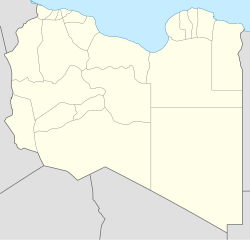Italian Benghazi
|
Benghazi City بنغازي Bangazi City |
|
|---|---|
| Nickname(s): رَبّايِةْ الْذَايِحْ (Mother of Migrants) - (The Intractable City) الْمَدِينََه الْعَصِيّهْ | |
| Location in Libya | |
| Coordinates: 32°07′N 20°04′E / 32.117°N 20.067°E | |
| Country | Libya |
| Region | Cyrenaica |
| District | Benghazi |
| Settled | as Euesperides (circa 525 BC) |
| Renamed | • Berenice (circa middle of the 3rd century BC) • Hesperides • Barneeq (circa middle of the 7th century AD) • Marsa ibn Ghazi (circa 16th century) • Bani Ghazi • Benghazi |
| Government | |
| • Mayor | Colonel Ahmed Laraibi |
| Area | |
| • City | 314 km2 (121 sq mi) |
| Elevation | 2 m (7 ft) |
| Population (2011) | |
| • City | 631,555 |
| • Density | 2,000/km2 (5,200/sq mi) |
| • Metro | 1,110,000 |
| Demonym(s) | Benghazino |
| Time zone | EET (UTC+2) |
| Area code(s) | (+218) 61 |
Benghazi /bɛnˈɡɑːzi/ (Arabic: بنغازي Banghāzī) is the second most populous city in Libya and the largest in Cyrenaica.
A port on the Mediterranean Sea in the Kingdom of Libya, Benghazi had joint-capital status alongside Tripoli, possibly because the King and the Senussi royal family were associated with Cyrenaica rather than Tripolitania. The city was also provisional capital of the National Transitional Council. Benghazi continues to hold institutions and organizations normally associated with a national capital city, such as the country's parliament, national library, and the headquarters of Libyan Airlines, the national airline, and of the National Oil Corporation. This creates a constant atmosphere of rivalry and sensitivities between Benghazi and Tripoli, and between Cyrenaica and Tripolitania. The population was 670,797 at the 2006 census.
On 15 February 2011,an uprising against the government of Muammar Gaddafi occurred in the city. The revolts spread by 17 February to Bayda, Tobruk, Ajdabya, Al Marj in the East and Zintan, Zawiya in the West, calling for the end of the Gaddafi Regime. Benghazi was taken by Gaddafi opponents on 21 February, who founded the National Transitional Council. On 19 March, the city was the site of the turning point of the Libyan Civil War, when the Libyan Army attempted to score a decisive victory against the NTC by attacking Benghazi, but was forced back by local resistance and intervention from the French Air Force authorized by UNSC Resolution 1973 to protect civilians, allowing the rebellion to continue.
...
Wikipedia

